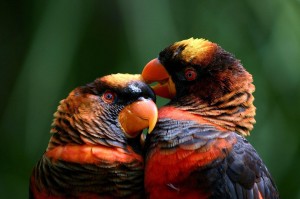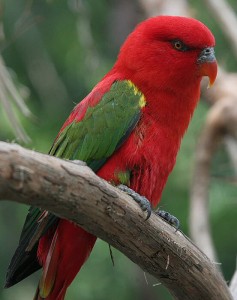Dusky Lory
Dusky Lory originated from Indonesia and Papua New Guinea. Dusky Lories, like other Lories and lorikeets alike have specialized brush-tipped tongues for feeding on nectar and soft fruits. In the wild they can feed from the flowers using their specialised tongues to take in nectar.
Dusky Lories make great pets, as they are excellent talkers and form strong bonds with their owners.
Nature
Dusky Lories are popular pets due to their intelligence, entertaining personality and stunning beauty. They are affectionate, curious, extroverted and clowny and exhibit some unique behaviour. They can be taught to talk and will become brilliants talkers with a
little patience and know-how.
Young birds should be socialized to many people and exposed to a variety of situations such as new cages, toys, visits to the veterinarian, handling by friends, and wing and nail clippings and to avoid fear of novel situations.
Cage
When selecting a cage, it is important to select the largest cage you can afford, remember the bigger the cage the happier the bird and you can create a better environment. Dusky Lories are very active birds; you will need room for many toys, perches, food/water dishes, as well as sufficient space for them to move around. Play time outside the cage must be supervised.
Care must be taken that old food does not accumulate in the cage, on perches or in feeders.
Dusky Lories are very playful and everything in their eyes is a toy. They love toys that make noise, such as bells as well as ropes, items for chewing and branches from trees, such as eucalypts, bottlebrush, acacias or Grevillia’s. In order to ensure safety, pet birds should not be allowed unsupervised freedom in the home as they often encounter toxins or dangerous items.
Diet
Dusky Lories have specialized brush-tipped tongues for feeding on nectar and soft fruits. They can feed from the flowers of about 5,000 species of plants and use their specialised tongues to take the nectar. The tip of their tongues have tufts of papillae (extremely fine hairs), which collect nectar and pollen. Due to this they cannot eat seed like most parrots.
Pet lorikeets require a nectar replacement diet, which are available at Birdsville. These mixes come in powder form and there are two main types of nectar replacement:
- Dry mix (Lorri-dry) – with dry, plenty of fresh drinking water needs to be made
available for the bird. - Wet mix (Lorri-wet) – with wet, their requirements for drinking will be reduced, as the feed contains a large amount of water, however fresh drinking water should still be made available.
Young birds should be feed on both wet and dry mix in separate containers and can later be weaned on to dry mix only.
Dusky Lorries also need their diet supplemented with fresh fruit and vegetables on a daily basis. Calcium perches, calcium supplements, spinach or silver beet leaves are important to provide calcium for the bird, due to their soft crop cuttlefish or shell grit is not recommended.
Your bird with also require vitamin mixed into their water every two to three
days. This is to provide essential vitamins and nutrients commonly deficient in
their diet.
Do not feed your bird (or any other bird) avocado, onion, chocolate, caffeine or alcohol.
Introducing your new bird to existing birds
Once you take your bird home you should keep it in a separate cage and allow the bird to adjust accordingly. Always allow at least 2 weeks before introducing the bird to your existing birds.
Hygiene
The cage requires regulars cleaning and old food shouldn’t ‘be allowed to accumulate in the cage, on perches or in feeders. Water should be changed daily basics.
Worming
Your bird will need to be wormed in a few weeks to two month after being taken home (check with the staff from Birdsville, when purchasing). Worming will need to be done every 6 month.
Lice & Mites
These are the two most common parasites of cage birds and their environment, but are easily controlled with a Mite and Lice spray, available at Birdsville. When using spray, spray bird, entire cage, perches, nesting box and toys, remember to remove all water and feed and avoid spraying in birds’ eyes.
Training
This is an important factor of having a well behaved hand raised bird. The bird should be handled in a quiet, relaxed situation like when you’re watching TV or reading, but don’t over stress your bird in the first few weeks of taking it home. The more time you spend with your bird, the better your bird will become.
Breeding
Dusky Lories are bred is breeding boxes with nesting material available at birdsville. They reach sexual maturity at 2 to 3 years of age and their expected life span is 8+ years provided their specific dietary needs are met. Males and females look alike and breeders depend on DNA or endoscopic sexing to determine their gender.
Found in store, for more details call Birdsville 9667 2555. More information coming soon.



